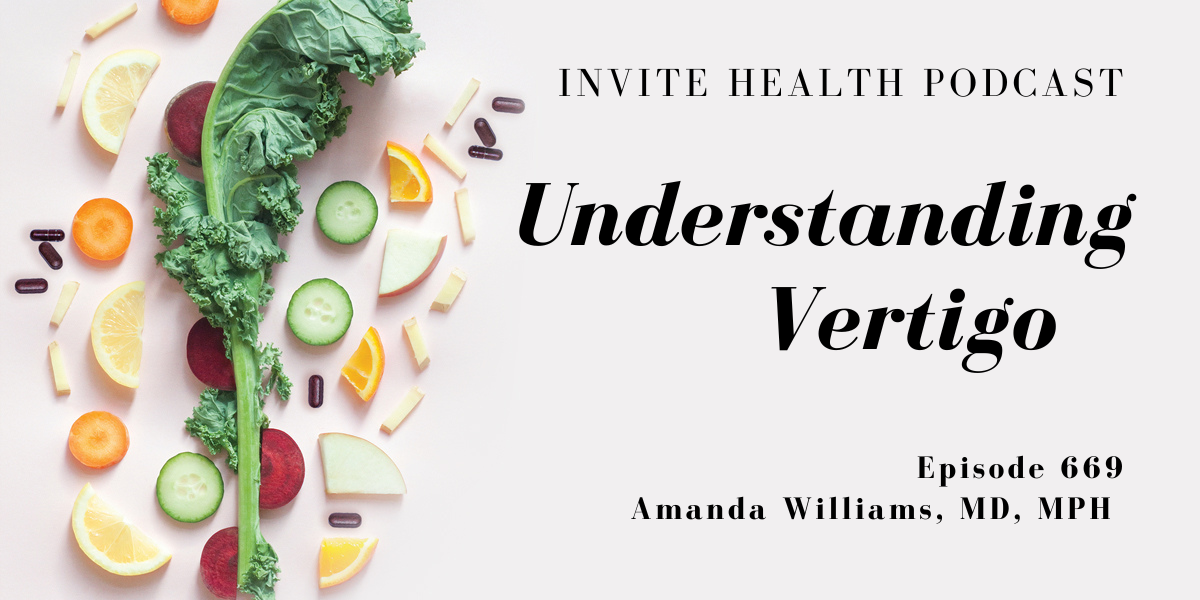Subscribe Today!
Please see below for a complete transcript of this episode.
UNDERSTANDING VERTIGO, INVITE HEALTH PODCAST, EPISODE 669
Hosted by Amanda Williams, MD, MPH.

*Intro Music*
InViteⓇ Health Podcast: [00:00:04] Welcome to the InViteⓇ Health Podcast, where our degreed health care professionals are excited to offer you the most important health and wellness information you need to make informed choices about your health. You can learn more about the products discussed in each of these episodes and all that Invite Health has to offer at www.invitehealth.com/podcast. First time customers can use promo code podcast at checkout for an additional 15% off your first purchase. Let’s get started. [00:00:34]
*Intro Music*
Amanda Williams MD, MPH: [00:00:40] At some point in your life you will likely experience if you haven’t already, that sensation of the room spinning or just feeling incredibly dizzy. This can happen for a variety of different reasons, but there are times where this can become a chronic problem and we oftentimes look at this as vertigo. So, I want to talk about, ‘What is vertigo?’ What is associated with vertigo? What are some of the common conditions that can exacerbate or even bring on this sensation of that spinning or that dizzy feeling? And what can we be doing in terms of lifestyle modifications as well as dietary supplements? I am Dr. Amanda Williams, scientific director at Invite Health, and we know that vertigo is a fairly common condition. We know that when we look at the statistics that roughly you know, 90 million Americans will go see their health care provider because of the sensation of vertigo or dizziness or they just feel off balance. It is one of the most common chief complaints as to why people go in to see their doctor. Like, I just feel dizzy, or I feel like I’m you know, the room is spinning on me. And many times we just we don’t recognize this as being a clue or an indicator for underlying health conditions. So, as I mentioned, maybe there can be problems such as sleep disorders, blood sugar regulation issues, blood pressure regulation issues. But at the end of the day, we want to be able to identify the root cause so that we can properly address this with those lifestyle modifications as well as dietary supplements. † [00:02:23]
[00:02:24] We know that there are many different supplements that we can turn to. There’s a strong correlation between Vitamin D and calcium and having low levels of both vitamin D and calcium and the worsening of that condition, vertigo. So, this is an area knowing that, you know, 90% of Americans, don’t get adequate or sufficient vitamin D from their diet. Now, you can start to draw that connection. Well, no wonder why so many people then can have these episodes where they feel off balance or they feel dizzy, and then we partner this up with those other underlying conditions, kind of that co-morbid presentation. Is there a problem going on with blood pressure? Is there a problem going on with blood sugar? And understanding all of these, looking at those risk factors is one of the keyways for us to really get to the heart of why vertigo actually occurs. Certainly, there is, you know, Meniere’s disease, which is not very common. Meniere’s disease is a disorder within the inner ear that, for most folks actually leads to more questions than it does answers. And trying to determine, you know, why this is happening. And oftentimes they will, you know, diagnose someone with Meniere’s disease and perhaps maybe it’s not, they’re just presenting like that, but maybe it’s technically vertigo with these underlying co-morbid conditions, such as the low blood sugar issue or that low blood pressure problem that can occur. So, kind of peeling back the layers of vertigo and understanding you know, what is actually occurring in the anatomy of the body, what is actually occurring in terms of the physiology? How is this presenting? Of course, we recognize it as feeling like the room is spinning and I personally, myself have had a couple of different pretty severe episodes of vertigo in my life. And you know what brought that on? Interestingly enough, for me, I noticed both times it was after flying. And so, you know, was it something having to do with the pressure difference, and, you know, trying to my body trying to auto regulate back to that equilibrium? That’s, you know, the likely root cause for me but there are, you know, a lot of different ways that we can really try to get to the heart of what is creating this. † [00:04:46]
[00:04:47] We know that there is, you know, the benign paroxysmal positional vertigo where many folks will notice this, where if they don’t feel like the room is spinning until they make a sudden movement. And so that positional change within the head, for example, is what can drive that spinning feeling. And we oftentimes talk about, you know, what’s going on in the inner ear and there’s a reason why. Because we know, based on the anatomy, that this is where the heart of that problem is coming from, so, we always want to be able to identify this. We know that there are so many different chronic disease states that are directly linked to vertigo. So, we can look at mood disorders, anxiety, depression. Clearly there’s so many metabolic conditions, including diabetes, pre-diabetes, for example having osteoporosis also, because once again, looking at that calcium and vitamin D deficiency as being a driving force. Definitely folks who experience migraines, there is a strong correlation between that aura sensation. When people talk about migraine with aura, maybe they feel that unsteadiness that is occurring. So, we can look at, you know, the background, why is this happening, looking at the structure of the inner ear. Obviously going to see an ENT, is where most folks who have vertigo will end up and then usually oftentimes then referred off to neurology. Because many times with ENT, is they don’t see any structural reason as to why this is occurring. So, then they’ll send the folks off to the neurology department and say, maybe you can figure it out. And so sometimes it’s a game of cat and mouse in a sense of trying to determine that real reason. That is why I always say it’s important to, to look. What are the common risk factors for vertigo as we grow older. Certainly, this is, you know, risk factor because we know that the blood flow can shift as we get older. The wearing and tearing of our vascular system certainly can lead to this problem. We know that many women experience this going through menopause, those hormonal fluctuations, identifying any type of a vitamin deficiency, vitamin D in particular. † [00:07:06]
[00:07:07] If you have a history of chronic disease states, the ones that I mentioned, diabetes, having, you know osteoporosis, having migraines, these are all, you know, risk factors for the development of vertigo. So you have these different ways to which vertigo is going to occur and, you know, what is it that we can be doing as far as really zeroing in on correcting those issues for you know, the traditional medicine approach, it’s usually trying to use antiemetics, you know, so maybe you feel nauseous because the room is spinning on you, but that’s really not the ideal path that we want to travel down because we’re not actually fixing that root cause, that imbalance of perhaps hormones. The imbalance of low coenzyme Q10, low vitamin D, low calcium. So, we always want to determine that. We want to look at the running blood pressure, we want to look at the running blood glucose. Is there indications that can clue us in that we’re having insulin resistance? Maybe we don’t have diabetes quite yet, but we have insulin resistance, and this is an exacerbating reason. So, in any event, we know that we can look at you know, different treatments, such as if it’s a positional vertigo. There are different movements and exercises that they will have a therapist work with folks on that. So, that’s, you know, one way. But then we want to look at what we can be doing as far as those lifestyle considerations, trying to eat an anti-inflammatory diet. Because if we have access inflammation that’s occurring, this is going to worsen everything as far as the nerves that feed into the ear and the vascular supply into the ear. So, foods definitely do matter. And we can see that having those high antioxidant foods definitely can be incredibly beneficial. We know that there’s different relaxation techniques, you know, mindfulness techniques that can definitely help, and then we turn to the main nutrients, looking at low vitamin D status and that direct correlation between vertigo and recurrent episodes of vertigo.† [00:09:28]
ICYMI: HE MINERAL MAGNESIUM & OUR BRAIN, INVITE HEALTH PODCAST, EPISODE 666>>LISTEN NOW!
[00:09:29] Because of that low serum vitamin D supplementation with vitamin D is going to be the answer. We can also look at adding in calcium to that mix as well. Now, there are many folks who will find that if their coenzyme Q10 levels are low that this can worsen their vertigo condition. So having your serum CoQ10 level done is also incredibly advantageous. We can look at the scientific studies and see how CoQ10 plays a very important role, not only in cardiac function, and neurological function, but also in conditions such as vertigo in the Pharmacological Therapies Journal, they talk about this, they talk about the role of coenzyme Q10 in conditions such as Meniere’s disease, that inner ear condition that drives up vertigo. And finding that CoQ10 supplementation is incredibly helpful to those who have vertigo and Meniere’s syndrome and one of the ways that they found that it’s working is through its regulation of that inflammatory response and helping with the regulation of the immune system, which is really quite interesting to see in this study how they’re drawing upon almost that gut-brain connection and how if we can target the inflammation, we can start to see that light at the end of the tunnel. So, that’s really quite an important study that was conducted, certainly there has been numerous studies done with Coenzyme Q10 and its benefits for patients who have migraine headaches. And in the Nutritional Neuroscience Journal back in 2019, they go into some detail on the effects of the clinical features and different inflammatory markers for folks who have been diagnosed with migraine headaches. And once they start to give them coenzyme Q10 as a supplement, how responsive those individuals are, not only did it help with lowering inflammation, and they had different markers to which they were looking for. Looking at interleukin six (IL-6), interleukin ten (IL-10), TNF alpha, which is Tumor necrosis factor alpha. But we can see that direct correlation. And the group in the particular study that they did with migraine headaches, the placebo group didn’t have any improvement. The group that was supplementing with coenzyme Q10 had significant improvement and their migraine attacks dropped significantly and that aura, that sensation of maybe feeling off balance or feeling dizzy was starting to go away once they started to supplement with coenzyme Q10. We can see the same thing with vitamin D. In the Journal of Science Progress, they talk about the impact of vitamin D supplementation on vertigo and the recurrence of vertigo. So, they did a meta-analysis where they were assessing Vitamin D levels in individuals who present with vertigo and drawing that correlation once again between low vitamin D and vertigo severity. And they could see that supplementation with vitamin D was a clear indicator that you could get improvement and lower that reoccurrence of vertigo episodes. If we can just start to maintain healthier serum Vitamin D levels. So, there’s a lot to it when it goes into understanding the pathophysiology behind vertigo and what we can be doing. † [00:12:57]
[00:12:57] But we know diet plays a big role, so an anti-inflammatory diet such as the Mediterranean Diet partnered up with coenzyme Q10, vitamin D, calcium, we can also add magnesium and vitamin C into the mix. So, we’re just kind of thinking about basic nutrients that we know oftentimes our diet perhaps is lacking in. This can definitely allow us to get through those troubling times of episodes of Vertigo. So, if you have experienced this yourself or maybe in the past after being sick with the common cold, you feel like you’re a little off, do make sure that you speak with one of our nutritionists, and they will help you identify the best supplements to encourage your body to have the ability to fight that off and to enhance your overall sense of well-being. So, I want to thank you so much for tuning in to the InViteⓇ Health Podcast. Remember, you can listen to all of our podcasts for free wherever you listen to podcasts, or by visiting invitehealth.com/podcast. Do make sure that you subscribe, and you leave us a review. You can follow us on Facebook, Twitter and Instagram, and we will see you next time for another episode of the InViteⓇ Health Podcast. †
*Exit Music*











